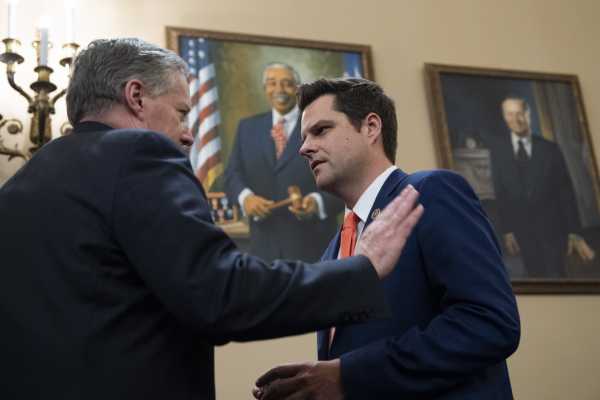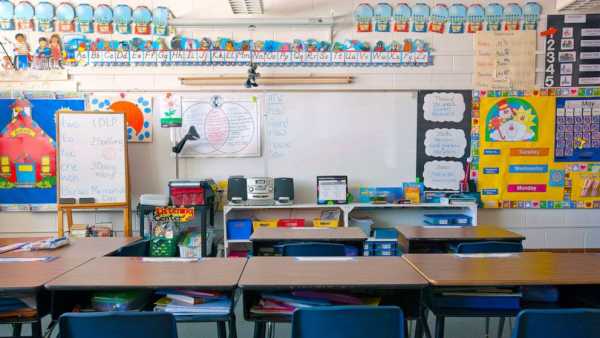
Rep. Matt Gaetz (R-FL) wore a gas mask on the House floor on March 4 ahead of voting on a bill to fund the response to the novel coronavirus, a public health crisis President Donald Trump has repeatedly downplayed. The stunt led to Gaetz being accused of making light of the coronavirus crisis — he claimed, however, that he was trying to make a point about lawmakers’ risk of coronavirus exposure given their public profiles: “We fly through the dirtiest airports, we touch everyone we meet, so if anyone’s gonna get coronavirus, it’s totally gonna be Congress.”
And, in fact, Gaetz may have been exposed to the virus: This week, he got tested for Covid-19, as American health care providers struggle to provide testing to everyone who needs it.
Gaetz, along with incoming White House Chief of Staff Mark Meadows, received the test after coming into contact with a person who has tested positive for Covid-19. Both Gaetz and Meadows tested negative, according to statements from both Tuesday.
Gaetz and Meadows followed a sound response: They’ve been under self-quarantine since learning of their exposure; in fact, Gaetz told the Pensacola News Journal that he slept in a Walmart parking lot “somewhere off of [Interstate] 85” in order to avoid checking into a hotel. And then they sought testing, even though they did not exhibit symptoms. (Experts say that infected people may not show signs of the illness for five days.)
But their access to the test has sparked a controversy. Nationwide, stories are cropping up of people who have symptoms of coronavirus being unable to get a test. The fact that two of Donald Trump allies who do not meet the criteria for most-at risk — which includes the elderly and those exhibiting symptoms — has struck many people as unfair. And the fact that Gaetz, specifically, seemingly made light of the outbreak, and then got a coveted test has also been called hypocritical by some Democrats — and even some Republicans.
“I find it interesting that when my colleagues were in contact with someone who later tested positive [they] were able to get tested almost immediately and quickly receive their results while folks in my district and across Washington state are unable to get their testing results back,” Rep. Jaime Herrera Beutler (R-WA) told Robert Redfield, director of the CDC, at a House Appropriations Committee hearing.
Tests are in high demand and seemingly short supply
As of Wednesday, more than 1,050 people have tested positive for the virus in the United States, according to the Johns Hopkins tracker. But state and local health officials say that the number is likely much higher, as they have struggled to obtain enough kits to test people presenting with symptoms. Anecdotal stories of people displaying coronavirus symptoms and being refused a test have begun popping up on social media, and there have been a number of reports of those who were later found to be infected being denied access to tests.
Redfield confirmed at a hearing that public health organizations were struggling to meet testing requirements. “The truth is, we’re underinvested in the public health labs,” he said in the hearing. “There’s not enough equipment. There’s not enough people. There’s not enough internal capacity. There’s no surge capacity.”
Federal officials have said that 75,000 testing kits have been distributed to public health labs as of March 6, with more going to other places, including hospitals and commercial labs.
Even with the number of available tests increasing, there’s no guarantee that patients presenting with Covid-19 symptoms will have access to testing, even if their doctors recommend it.
In addition, there could be a delay in the reporting of results as there’s a limit to the number of tests that many state, federal, and commercial labs can process each day. And Politico reports the head of the Centers for Disease Control and Prevention (CDC) has voiced concern about a shortage in a material needed to do that processing.
Given these limitations, the CDC recommends that doctors and hospitals prioritize testing for people who are hospitalized and showing symptoms of the virus, elderly people, and other immunocompromised patients. Neither Gaetz nor Meadows meet those guidelines, but were able to access testing anyway.
According to a Washington Post report, both sought out testing at Walter Reed National Military Medical Center in Bethesda, Maryland. The facility often treats federal lawmakers and is associated with both the White House physician’s office and the congressional attending physician.
Should lawmakers get priority?
There is some disagreement in Congress, including among Democrats, over whether lawmakers and high-level government officials should have easier access to testing than the general population.
House Majority Leader Steny Hoyer said it was important for Congress to continue operating as normally as possible. “Look, we want to have all Americans have tests,” he said Monday. “But we also want to make sure that the Congress can respond to this crisis so we can protect all Americans.”
But House Speaker Nancy Pelosi disagreed, saying that members of Congress should receive the same treatment as everyone else. “I think we have to take care of the people first,” she said Tuesday.
Trump told reporters Tuesday that he had not yet been tested, despite being exposed to Gaetz and Meadows. He said that White House physician Sean Conley “sees no reason to do it — there’s no symptoms, no anything.”
“I don’t think it’s a big deal. I would do it,” he said, adding “it’s not a big deal to get tested.”
As more tests become available, those in the general public concerned but not yet exhibiting symptoms may be able to receive Covid-19 tests. But for now — despite Gaetz and Meadows being tested — it would seem access to testing will continue to be based on symptoms, rather than risk of exposure.
Sourse: vox.com






